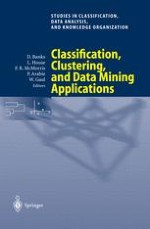2004 | OriginalPaper | Buchkapitel
Academic Obsessions and Classification Realities: Ignoring Practicalities in Supervised Classification
verfasst von : David J. Hand
Erschienen in: Classification, Clustering, and Data Mining Applications
Verlag: Springer Berlin Heidelberg
Enthalten in: Professional Book Archive
Aktivieren Sie unsere intelligente Suche, um passende Fachinhalte oder Patente zu finden.
Wählen Sie Textabschnitte aus um mit Künstlicher Intelligenz passenden Patente zu finden. powered by
Markieren Sie Textabschnitte, um KI-gestützt weitere passende Inhalte zu finden. powered by
Supervised classification methods have been the focus of a vast amount of research in recent decades, within a variety of intellectual disciplines, including statistics, machine learning, pattern recognition, and data mining. Highly sophisticated methods have been developed, using the full power of recent advances in computation. Many of these methods would have been simply inconceivable to earlier generations. However, most of these advances have largely taken place within the context of the classical supervised classification paradigm of data analysis. That is, a classification rule is constructed based on a given ‘design sample’ of data, with known and well-defined classes, and this rule is then used to classify future objects. This paper argues that this paradigm is often, perhaps typically, an over-idealisation of the practical realities of supervised classification problems. Furthermore, it is also argued that the sequential nature of the statistical modelling process means that the large gains in predictive accuracy are achieved early in the modelling process. Putting these two facts together leads to the suspicion that the apparent superiority of the highly sophisticated methods is often illusory: simple methods are often equally effective or even superior in classifying new data points.
